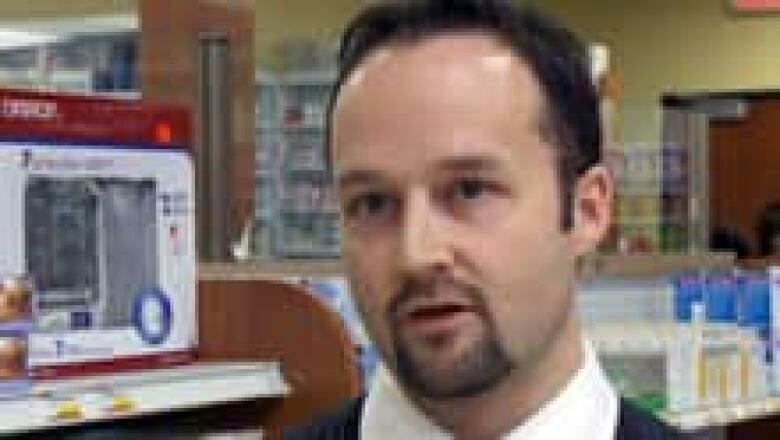Pharmacy moves to curb Ottawa fentanyl abuse
Prescription narcotic has become a deadly street drug in past 5 years
An Ottawa pharmacist said his store will be requiring people looking to renew prescriptions for the powerful narcotic fentanyl to provide all of the used patches from their previous prescription, in an effort to curb abuse.
Westboro Pharmasave owner and manager Mark Barnes said he hopes the measure will curb the resale or abuse of fentanyl, which has quickly replaced the discontinued OxyContin as the prescription narcotic of choice on the street in Ottawa and across the province.
Barnesfills out prescriptions offentanyl tocustomers suffering from severe chronic pain or in need of the powerful opiate as part of their palliative care. In this regard, he says, fentanyl works well, providing long-lasting pain relief.
Street addicts to whom he prescribes methadone were telling him a different story about the drug's misuse.
"I had a very seasoned methadone patient tell me that they used heroin for years one patch of fentanyl and there was an OD situation where she had to be ventilated, intubated and spent several weeks in hospital. [She] never touched it again," said Barnes.
Need help?
Local resources
"Fentanyl is crazy. Ultimately, they are terrified," he said.
Problems controlling prescription drug
Fentanyl is a controlled substance under federal narcotic control regulations, which prohibit possession, producing or importing or exporting the drugs without authorization.
But as with oxycodone products, fentanyl has proven a challenge for police and health professionals to manage because it is legally available with a prescription.
Pharmacies in Ontario already have access to the province's narcotics monitoring system, which allows pharmacists to check that people filling out prescriptions aren't getting them from more than one doctor or more than one pharmacy.
The challenge for pharmacists is what to do when approached by people with legitimate prescriptions.
Barnes came up with his solution in part to stop people from tampering with or selling their patches, which are worth significantly more when sold illegally as a recreational drug.

Police push for patch exchange
The patch exchange program is something Ottawa police have been hoping pharmacies would adopt, said Staff Sgt. Kal Ghadban with Ottawa Police's street crime and break-ins unit.
Ghadban said police were alarmed at how widespread the drug was in schools and across the city when they first became aware of the extent of the problems with the drug a year ago.
The signs of fentanyl
What others observe in users of fentanyl and other opioids:
- Drowsinessor"thenod."
- Constrictedorpinpointpupils.
- Slurredspeech.
- Impairmentinattentionormemory.
Opioid withdrawal signs:
- Dilatedpupils.
- Anxiety,irritability,anger(drugcraving).
- Agitation(cannotsitstill).
- Appearstobeill:nausea,vomiting,diarrhea,sweatsandchills,wateryeyes,runnynose.
- YawningandInsomnia.
(Source: The Royal)
"We've heard of grandparents actually giving it to their grandchildren because they feel bad for them," said Staff Sgt. Kal Ghadban with Ottawa Police's street crime and break-ins unit.
"They see that they are suffering because they are so highly addicted and rather than see them suffer they are actually giving it to them because they don't believe it's harmful. And that's the myth, because it's something that's legal, something prescribed," said Ghadban.
Fentanyl has deadly reputation
The fentanyl patch is designed to slowly release the potent drug over 72 hours, but drug addicts have found ways to smoke, chew, inject or otherwise ingest it all at once. The result can be deadly.
From 2009 to 2011, an estimated 253 deaths in the province have been linked to fentanyl, according to Ontario's Office of the Chief Coroner.
Fentanyl has already been blamed for the deaths of at least two youths in eastern Ontario, according to Ottawa police, and it is suspected as a likely cause of death in a number of other deaths in the National Capital Region, including the death of two men at a Booth Street apartment last year.
Steve Post, a drug user in Vanier for most of his 49 years, said the numbers are much higher. He said in the last year alone 16 to 17 of his friends have died from a fentanyl overdose.
Doctors 'naive'
Ottawa doctor Mark Ujjainwalla said part of the problem with fentanyl is that doctors prescribing the drug may not be versed on its potential misuse and addictive qualities.

"I don't think [doctors are prescribing] it because they're trying to injure anybody," said Ujjainwalla. "I think they're doing it because they believe it's the right thing to do. It's because they're naive and at times being manipulated by the addicted individual and at other times they don't understand the potency of addiction and how easily someone could die."
Barnes thinks medical students, residents and new doctors need to be educated on when and how to document the use of the drug.
Ottawa mental health care centre The Royal is hosting a public lecture Thursday night on prescription opioids, including fentanyl, and how people can recognize the signs of abuse.
The Royal also provides training and consultation to family physicians through its intervention service, which provides detoxification and follow-up services for people with opioid addictions who under 30 and with less than five years of opioid use.
Make it harder to abuse
Many addiction workers, medical professionals and addicts CBC spoke with said they'd ultimately like to see the pharmaceutical companies that produce the drug and the federal government do something to make it harder for the drug to be abused, in the same way Oxycontin was taken off the shelves and replaced by OxyNeo.
Teva Pharmaceuticals, the company that makes ratio-Fentanyl, one of the available patches on the market, told CBC News they had no comment at this time.
In a statement, a Health Canada spokesperson said tackling prescription drug abuse is bigger than any one specific medication.
"Health Canada wants to make sure that legitimate patients have access to drugs that our scientists determine are safe and effective when used as directed," spokeswoman Blossom Leung wrote in an emailed response
"We believe we can apply the law as it currently exists to help make meaningful changes to the overall system, and make it harder for people to abuse prescription drugs," she said.













_(720p).jpg)


 OFFICIAL HD MUSIC VIDEO.jpg)
.jpg)



























































































